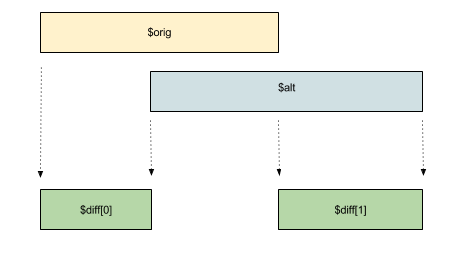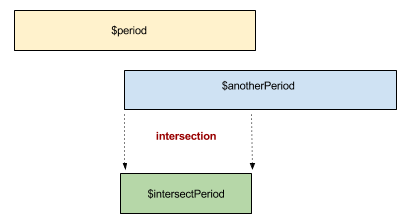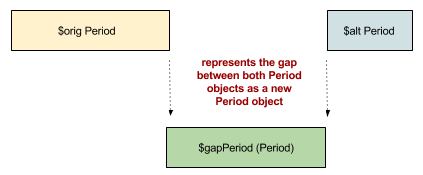Comparing Period objects
You can compare different Period objects according to their datepoints or durations.
Using datepoints
Period::isBefore
Description
<?php
public Period::isBefore(mixed $index): bool
Tells whether the current Period object datetime continuum is entirely before the specified $index.
Parameter
The $index argument can be another Period object or a datepoint.
Example
<?php
use League\Period\Period;
//comparing a datetime
$period = Period::createFromMonth(1983, 4);
$alt = Period::createFromMonth(1984, 4);
$period->isBefore($alt); //returns true;
$alt->isBefore($period); //return false;
Period::isAfter
Description
<?php
public Period::isBefore(mixed $index): bool
Tells whether the current Period object datetime continuum is entirely after the specified $index.
Parameter
The $index argument can be another Period object or a datepoint.
Example
<?php
use League\Period\Period;
//comparing a datetime
$period = Period::createFromMonth(1983, 4);
$alt = Period::createFromMonth(1984, 4);
$alt->isAfter($period); //returns true;
$period->isAfter($alt); //return false;
Period::abuts
Description
<?php
public Period::abuts(Period $index): bool
A Period abuts if it starts immediately after, or ends immediately before the submitted Period without overlapping.

Example
<?php
use League\Period\Period;
$period = Period::createFromMonth(2014, 3);
$anotherPeriod = Period::createFromMonth(2014, 4);
$period->abuts($anotherPeriod); //return true
//in this case $period->getEndDate() == $anotherPeriod->getStartDate();
Period::overlaps
Description
<?php
public Period::overlaps(Period $period): bool
A Period overlaps another if they share some common part of their respective datetime continuum without abutting.
Example
<?php
use League\Period\Period;
$orig = Period::createFromMonth(2014, 3);
$alt = Period::createFromMonth(2014, 4);
$other = Period::createFromDuration('2014-03-15', '3 WEEKS');
$orig->overlaps($alt); //return false
$orig->overlaps($other); //return true
$alt->overlaps($other); //return true
Period::sameValueAs
Description
<?php
public Period::sameValueAs(Period $period): bool
Tells whether two Period objects shares the same datepoints.
Example
<?php
use League\Period\Period;
$orig = Period::createFromMonth(2014, 3);
$alt = Period::createFromMonth(2014, 4);
$other = Period::createFromDuration('2014-03-01', '1 MONTH');
$orig->sameValueAs($alt); //return false
$orig->sameValueAs($other); //return true
Period::contains
Description
<?php
public Period::contains(mixed $index): bool
- A
Periodcontains a datepoint reference if this datepoint is present in its datetime continuum. - A
Periodcontains anotherPeriodobject if the latter datetime continuum is completely contained within thePerioddatetime continuum.
Parameter
The $index argument can be another Period object or a datepoint.
Example
<?php
use League\Period\Period;
//comparing a datetime
$period = Period::createFromMonth(1983, 4);
$period->contains('1983-04-15'); //returns true;
$period->contains($period->getEndDate()); //returns false;
//comparing two Period objects
$alt = Period::createFromDuration('1983-04-12', '12 DAYS');
$period->contains($alt); //return true;
$alt->contains($period); //return false;
Period::diff
Description
<?php
public Period::diff(Period $period): array
This method returns the difference between two Period objects only if they actually do overlap. If they do not overlap or abut, then an Exception is thrown.
The difference is expressed as an array. The returned array:
- is empty if both objects share the same datepoints;
- contains one
Periodobject if both objects share only one datepoint; - contains two
Periodobjects if no datepoint are shared between objects. The firstPerioddatetime continuum is always entirely set before the second one;

Example
<?php
use League\Period\Period;
$orig = Period::createFromDuration('2013-01-01', '1 MONTH');
$alt = Period::createFromDuration('2013-01-15', '7 DAYS');
$diff = $period->diff($alt);
// $diff is an array containing 2 Period objects
// the first object is equal to new Period('2013-01-01', '2013-01-15');
// the second object is equal to new Period('2013-01-23', '2013-02-01');
$diff[0]->isBefore($diff[1]); //return true;
//this is always true when two Period objects are present
Period::intersect
Description
<?php
public function intersect(Period $period): Period
An Period overlaps another if it shares some common part of the datetime continuum. This method returns the amount of the overlap as a Period object, only if they actually do overlap. If they do not overlap or abut, then an Exception is thrown.

Example
<?php
use League\Period\Period;
$period = Period::createFromDuration('2012-01-01', '2 MONTHS');
$anotherPeriod = Period::createFromDuration('2012-01-15', '3 MONTHS');
$intersectPeriod = $period->intersect($anotherPeriod);
Period::gap
Description
<?php
public function gap(Period $period): Period
A Period has a gap with another Period if there is a non-zero interval between them. This method returns the amount of the gap as a new Period object only if they do actually have a gap between them. If they overlap a Exception is thrown.

Example
<?php
use League\Period\Period;
$orig = Period::createFromDuration('2012-01-01', '2 MONTHS');
$alt = Period::createFromDuration('2013-01-15', '3 MONTHS');
$gapPeriod = $orig->gap($alt);
Using durations
Sorting objects
Description
<?php
public Period::compareDuration(Period $period): int
public Period::durationGreaterThan(Period $period): bool
public Period::durationLessThan(Period $period): bool
public Period::sameDurationAs(Period $period): bool
The method Period::compareDuration compares two Period objects according to their duration. The method returns:
1if the current object duration is greater than the submitted object duration;-1if the current object duration is lesser than the submitted object duration;0if the current object duration is equal to the submitted object duration;
To ease the method usage you can rely on the following proxy methods:
Period::durationGreaterThanreturnstruewhenPeriod::compareDurationreturns1Period::durationLessThanreturnstruewhenPeriod::compareDurationreturns-1Period::sameDurationAsreturnstruewhenPeriod::compareDurationreturns0
Examples
<?php
$orig = Period::createFromDuration('2012-01-01', '1 MONTH');
$alt = Period::createFromDuration('2012-01-01', '1 WEEK');
$other = Period::createFromDuration('2013-01-01', '1 MONTH');
$orig->compareDuration($alt); //return 1
$orig->durationGreaterThan($alt); //return true
$orig->durationLessThan($alt); //return false
$alt->compareDuration($other); //return -1
$alt->durationLessThan($other); //return true
$alt->durationGreaterThan($other); //return false
$orig->compareDuration($other); //return 0
$orig->sameDurationAs($other); //return true
$orig->sameValueAs($other); //return false
//the duration between $orig and $other are equals but not the datepoints!!
Returning the duration differences
Description
<?php
public Period::dateIntervalDiff(Period $period): DateInterval
public Period::timestampIntervalDiff(Period $period): float
Return the duration difference between two Period objects using a DateInterval object or expressed in seconds.
Examples
<?php
use League\Period\Period;
$period = Period::createFromSemester(2012, 1);
$altPeriod = Period::createFromWeek(2012, 4);
$diff = $period->dateIntervalDiff($altPeriod);
// $diff is a DateInterval object
$diff_as_seconds = $period->timestampIntervalDiff($altPeriod);
//$diff_as_seconds represents the interval expressed in seconds